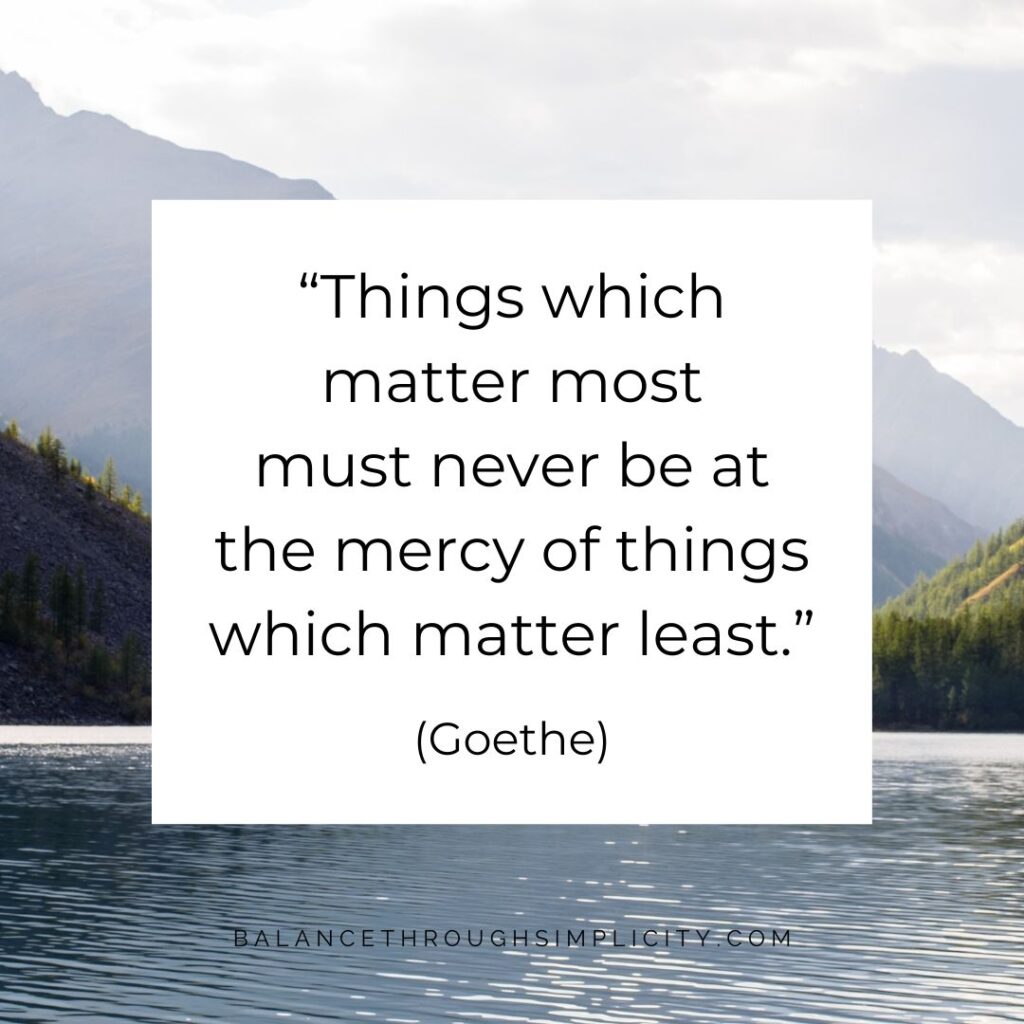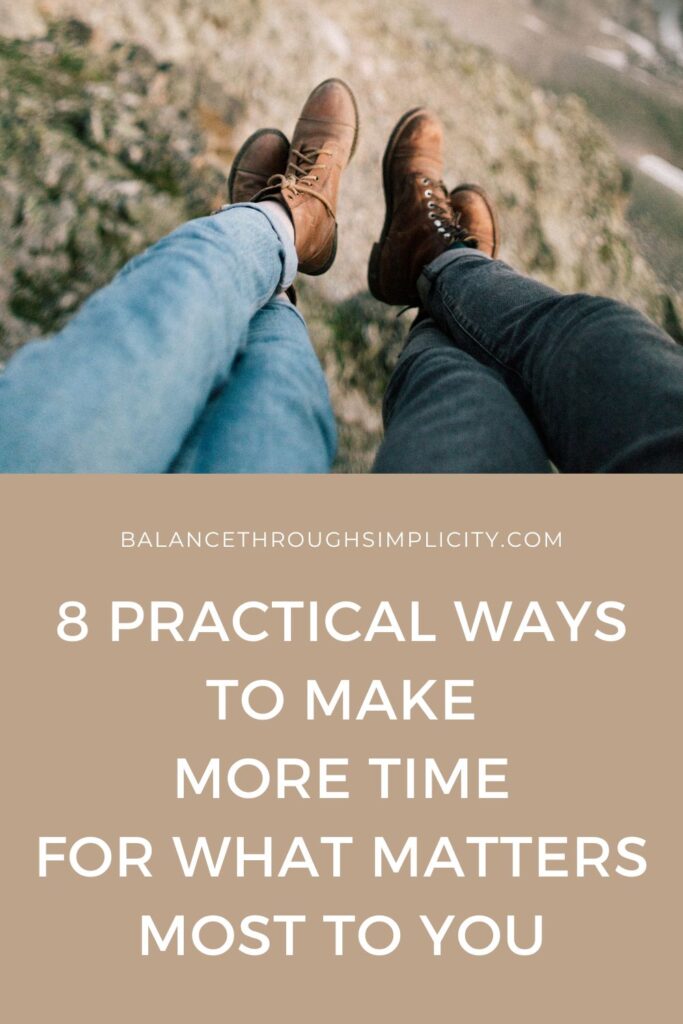HOW TO MAKE TIME FOR WHAT MATTERS MOST: 8 PRACTICAL TIPS
Life can be complicated and pull us away from our priorities. It requires a conscious effort to create time, space and freedom for the things we want to do, not just what we need to do. In this article I’m sharing 8 practical tips to help you make time for what matters most.
SIMPLE, INTENTONAL LIVING AND SCHEDULING YOUR PRIORITIES
I think it happens to all of us.
If you don’t keep your eye on the ball, it’s easy for life to get complicated. With jobs, family, bills to pay and the stresses and strains of modern life, we can find our days, homes and brains filling up whilst our energy levels and free time deplete just as fast.
The things that matter most get pushed aside whilst we just get through the day.
A simple, intentional life makes time for what matters. In other words…
“Things which matter most must never be at the mercy of things which matter least.”
Johann Wolfgang von Goethe
In this article I’d like to share 8 ideas on how to make time for what matters most. A mix of decluttering, productivity and value-led tips to help you stop rushing from A to B and focus on your direction instead.
8 WAYS TO HELP YOU MAKE TIME FOR WHAT MATTERS MOST
Here are 8 ways to make time for what matters most in your life plus some extra links and resources to help you on your way.
1. Identify your priorities
One of the most fundamental ways you can make time for what matters most is to understand what’s really important to you. It’s about identifying your priorities, values and beliefs and doing something to honour and work towards them every day.
Without priorities, we fill up our diaries, homes, to do lists and minds because everything seems important.
Define your priorities and then filter your day, schedule and life to make space and time for the things that matter to you.
Perhaps try asking yourself some questions:
- What makes me happy?
- What do I look forward to?
- What do I want more of in my life?
- What do I want less of?
Your priorities might come and go with different stages in your life. For example, career was important to me, before I had kids. Travelling was important to me before I realised that I was just using it to escape from my busy life.
Check in with yourself regularly to make sure that your life aligns with your current priorities and that you’re using those priorities to help you focus on what matters most.
Further reading: How to Define Your Priorities and Why It Matters (plus get a free worksheet to help you get clear on YOUR priorities.

2. Own less stuff
Take a look around your home right now. Peek inside your cupboards, root around your closet, venture to look under your bed or in the attic! What do you see and how does it make you feel?
For many of us, too much stuff at home takes up our time and energy. We have to clean and look after it and move it from place to place. Everything in our homes sends out messages. Too many messages clutter the mind and remove or distract us from what’s really important.
Reflect for a moment on that stuff in your home.
- What would happen if you cleared some of it?
- Could you free up space?
- Free up your time?
- Do you use it, did you ever use it?
- Does that stuff make you happy?
- Could you have spent that money more wisely?
Decluttering has many benefits. More than just decluttering, actually owning less stuff makes your home easier to manage too. I don’t believe your life should run on auto-pilot but I do like the idea of my home running on auto-pilot!
Clearing the clutter, thinking differently about whether I need all that stuff in my life and making it simpler to manage my home, have all helped me make time for what matters most to me.
Try these 50 things to declutter right now or practice the gentle method of slow decluttering if that’s more your pace.
Further reading: The Psychology Behind Decluttering: Why Does It Make You Feel Good?
3. Create simple daily routines
These could be personal self-care routines for yourself, household routines to manage your home, or even a daily routine to map out your day.
Routines don’t have to be rigid but they provide loose structure and framework for your life so that everything gets done, as and when needed, without you having to think about it too much.

4. Do less
You can create a more meaningful life by doing less. I don’t mean not doing anything but I do mean doing less of the things that just waste and clutter your time. Less time spent like this, means more time for the things that you want to do in life and that align with those priorities we looked at in point 1.
If someone else looked at your diary, what would that tell them about YOU? Would they be able to see what’s important to you in life from what they can see on your schedule?
When life is out of sync and not in alignment with your priorities then it’s easy for our schedules to look far different from the schedule we’d like to be living.
Busy is to some extent part of everyday life, but do you ever stop to think about what you’re busy doing?
- Are you busy because you’re hiding behind something?
- Busy because you think you should be?
- Busy because you hadn’t noticed all the things you take on?
Look at your diary now. Think about the things that you don’t want to do or that you no longer enjoy. Could you remove any of them and give yourself some free time instead?
Doing less isn’t a sign of laziness, lack of inspiration or that you’re doing anything wrong. It’s more about creating space in your day like you’d create space in your home.
Why not do less and explore the art of slow living. I call it an art because it’s a skill that modern, busy life doesn’t let us practice very often. Go against the norm, stop caring what others think and slow down. You could even introduce your family to slow living as there are some wonderful benefits to a slower pace for not just you, but your family too.
Further reading: A Beginner’s Guide to Slow Living
5. Learn to say no
It’s such a little word but it’s packed with power and sometimes quite difficult to say!
I’m a people-pleaser and used to be very bad at saying no. I didn’t want to let anyone down, cause offense or seem unfriendly or unhelpful. As a result, I was saying yes to every after-school club for my kids and every invitation out with friends.
Every opportunity that came my way I greeted with an outwardly enthusiastic (but inwardly reluctant) yes.
The problem was that in saying yes to all these things, I was saying no to other things that were actually more important to me. I craved free time, time playing with my kids or reading my book.
The things I was saying ‘yes’ to were taking me further away from what I really wanted in life because I was too afraid of what would happen if I said no.
Of course, saying no doesn’t just apply to your schedule. You might need to learn to say no to unhealthy habits, no to too much screen time, no to buying that extra pair of shoes.
“I don’t say no because I’m so busy. I say no because I don’t want to be so busy.”
Courtney Carver
No doesn’t mean no all the time. It doesn’t mean no forever. It just means no, not right now.
Saying no is like a muscle. It gets stronger the more you use it. Learn when and how to say no yourself and you’ll be able to make time for what matters most to you.
Further reading: How To Be Less Busy

6. Organise and automate
Using practical tools to help you be more efficient and effective can really simplify your life and help create more free time for what matters to you.
Here are some examples:
- Keep a shopping list on your fridge door
- A diary on your noticeboard
- Put aside time on Sunday to prepare for the week ahead
- Set up reminders and alerts on your phone
- Automate your bills to be paid by direct debit
- Keep a notebook on your nightstand to jot down thoughts that come to you in the night
- Declutter your paperwork and action, file and get rid of papers regularly
- Meal plan for the week ahead
- Follow my monthly checklist to help get you ready for the coming month
There are so many ways that you can help your life run more smoothly and simply and which give you mental space and time for other things in life.
Further reading: 25 Ways to be More Organised
7. Simplify your wardrobe
One of the first decisions you probably make each day is deciding what to wear. If time is tight, your closet is cluttered or you don’t really like what’s in there, it makes choosing your outfit for the day a little stressful and frustrating. And, as most of us have to choose our outfits 7 days a week, 365 days a year, what might seem a trivial little problem soon mounts up.
In fact, decluttering my clothes was one of my own first decluttering projects. I was busy every morning, trying to get my kids ready for school and myself ready for work. My stress levels were high and the clock was ticking so, by the time I’d made it into work, I looked (and felt) frazzled.
Simplifying my wardrobe, keeping clothes I loved and sticking with a sort of uniform, or go-to style, saved me time and stress. I think I looked better so I felt better too and everybody in my family enjoyed the knock-on effect of a calmer, happier me!
Not only did this create more time in a busy morning, but it reduced decision fatigue and the daily stress of finding something to wear for my lifestyle (meetings one moment, school run the next).
Many successful people tend to stick with a minimalist, capsule wardrobe because it frees up mental space, energy and time for what matters most. Read more about the benefits of a capsule wardrobe.
Further reading: How to be Ruthless When Decluttering Clothes (to make deciding what to wear easier, quicker and more fun!)
8. Be happy in yourself
One of the most important and impactful ways, but not perhaps the most obvious, to make time for what matters is to accept yourself for who you are and what you have.
When we don’t have peace in ourselves then we can’t expect to find peace anywhere else. Comparison, envy, resentment, frustration, perfectionism and unrealistic expectations lead to a complicated life of chasing the wrong things for the wrong reasons.
For a simpler life aligned with what’s important to you, try focusing on what you have, not what you haven’t. Change the things you can, stop trying to control what you can’t. Enjoy the little things in your day because the sum of these make up your life.
Your life is just that – it is the life that you created and you are in charge (for the most part anyway) of which direction it takes and what fills your days.
That’s not to say that contentment should lead to stagnation. In fact, minimalism supports personal growth and self-development in many ways. But healthy self-acceptance and inner peace can help keep the clutter away from our homes, hearts and schedules.
Further reading: Does Minimalism Broaden the Mind or Narrow Your Horizons?

SHARE YOUR THOUGHTS
Do you have enough time for what matters to you? Does your schedule reflect your priorities or is it a consequence of the priorities and To Do’s of other people? How do you balance your own needs with the needs of your commitments and responsibilities? Do you feel happy with your schedule or could it do with an overhaul?
I’d love to hear your thoughts so please leave a comment below!
Here are some more articles to help you make time for what matters most:
- High Impact Decluttering Strategies for When You’re Struggling to Clear Clutter – Sometimes decluttering can be difficult and the traditional decluttering checklists and tips just don’t work. If this is a problem you’re facing, here are some high impact decluttering strategies for when you’re struggling to declutter.
- Why Minimalism Is Not Just About Your Stuff – Minimalism involves decluttering and getting rid of things you no longer need, want or add value to your life but the minimalist lifestyle is also so much more. Here are some reasons why minimalism is not just about your stuff.
- 32 Practical Ways to Declutter Your Life Today – Sometimes life is busy and complicated. It feels even more difficult to try to simplify when we can’t press the pause button on that life and work out what to simplify, let alone how to do it. Here are 32 practical ways to declutter your life today if you’re craving more time, space and ease in your every day.
- Minimalism and Time Management: How The Minimalist Lifestyle Can Improve Your Productivity – The minimalist lifestyle encourages you to sift out the clutter and intentionally focus on what matters. In many ways, this approach echoes the principles of good time management. In this article, we’re looking at the relationship between minimalism and time management and how a minimalist lifestyle can improve your productivity and help you get things done, simply and strategically.
DON’T MISS OUT!
I’m Antonia and on this blog I share practical inspiration to simplify your home, time and life. Follow me on Instagram, Facebook and Pinterest! You can also subscribe to Balance Through Simplicity and receive regular simplicity tips straight to your inbox for free. Make sure you never miss an article plus you’ll get a copy of my free Declutter Starter Kit as a welcome gift!

